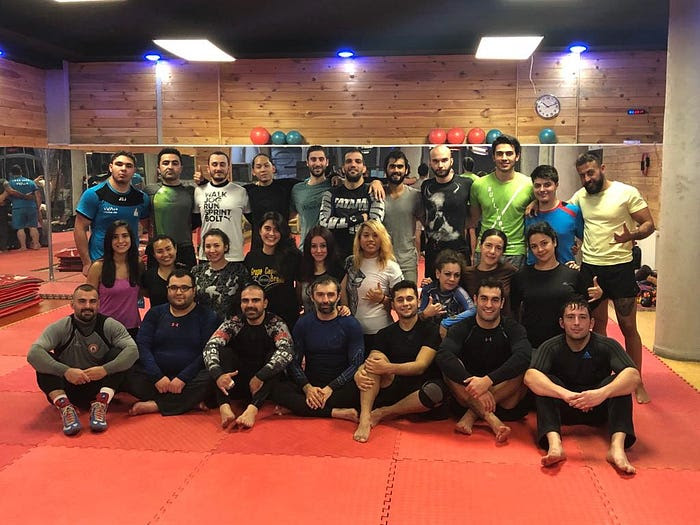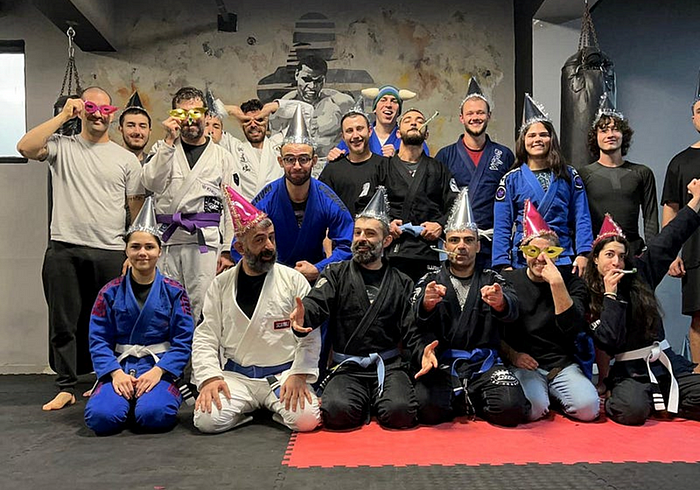.:: BLOG
Brazilian Jiu-Jitsu is a Team Sport

This, in the photo above, is my tribe. My community of Brazilian Jiu-Jitsu practitioners. My team. It includes my son, some of my best friends, my work colleagues, people from all walks of life, some of which, if not for jiu-jitsu, I would have never met. People of different ages, genders, and backgrounds. United in their quest to become a better version of themselves, by putting their bodies and minds through a grind of regular martial arts training.
Brazilian Jiu-Jitsu is a team sport. That’s right. You compete alone, sure. But you train and grow together. Whatever your reasons are for training — you want to improve your self-defense, you are a competitive athlete, you are just trying to get some physical activity in and de-stress — the training environment builds the team chemistry that has a significant impact on our growth both as jiu-jitsu practitioners as well as human beings.
As I wrote in one of my other articles: “The people you will meet come from different parts of the world, cultures, religions. There will be the random 110 kg man who wants to lose weight, the 50 kg woman who wants to learn how to defend herself, an 8-year-old who wants to be able to deal with a school bully, a 55-year-old who just wants to be fitter — all in the same room with, say, a professional fighter preparing for his next bout.”
Think of your first impression when you walk into a BJJ gym. You see everyone sparring in pairs. It is easy to see the sport as a one-on-one activity. But while you are winning or losing alone, you cannot grow and improve without everyone else on the team.
Your Team is the Key
It is straightforward in training. You drill, you roll with your teammates. We all have tried to do more solo drills, but let’s face it, they are boring. Have you tried to work out with a wrestling dummy? Boring again. There is no substitute for training with a live and resisting opponent. You get realistic reactions, pressure, and resistance. You can communicate and ask to reset the position. You observe their movement and adjust your own. You learn something every time, whether you are submitting or getting submitted. You go light if your teammate obliges. Or you can go hard if your teammate is game. You can try different modes of training depending on your objectives, or levels of energy. You will find a willing sparring partner for each situation.
You roll with lower belts and you can practice your attacks, you can experiment, and test your defenses by putting yourself in bad positions. You roll with higher belts and they will guide you, let you work in some positions, and even put themselves in dangerous spots because they know how to protect themselves. Sometimes just one small tip, one adjustment from a higher belt can change the way you see the position and improve your game instantly. Similarly, you can give one tip to a lower belt and they can instantly and visibly improve.
You roll with big strong guys and lightweights. You roll with the teammates who are strong and those who are flexible. You roll with men and women, children, and older teammates. You roll with someone with long limbs, and someone else who is short and stocky. In our team, Barbaros brings speed, Shahab brings size and power, Zafer and Ozan have very long limbs, and Kivanc is insanely strong — each one of our teammates does something that is different, sometimes unexpected — since most people cannot do some things that they do. Some are intense, others are always chill. Some come with slick technique, others with crazy cardio. The move that works on one, may not work on another. And so you learn, adjust, improve in real-time, and get better at applying your techniques to different types of opponents.
My favorite sparring partner is my 18 year old son, Alp Arslan — he is like water — you cannot rattle him, you cannot tire him. He just keeps coming and almost every time he springs some new technique at you. Since he has done countless sparring sessions with me, he knows my game all too well, so I have to be on my A-game to do damage. He sees my attacks coming a mile away, and that, in turn, helps me get better.
Training follows a class structure. You need it to be systematic — but we don’t keep things too rigid, everything is light-hearted and fun. Then there are open mats that when handled correctly, can promote creativity and sometimes unexpected lessons. I love open mats. Anyone can match up with anyone and just have fun. Sometimes it feels like I am in a workshop with fellow craftsmen trying to figure things out together. Share the knowledge and elevate the team as a whole, not just myself as an individual. Show my signature moves to my teammates and make it a little bit more difficult for me to hit these moves next time — forcing me to upgrade my game and avoid getting complacent. Here, this is how I do my guillotine, my footlocks, my kesa gatame, my butterfly guard. I will happily share whatever I feel I am good at. And I must say, the same goes for my teammates. Generosity in sharing knowledge is one of the key things that define our team.
All this helps build team spirit, the spirit of collaboration, and respect. We rely on each other to learn, to practice, to get a serious workout. We share the knowledge and all this prepares you for the competition, after all — the way you train is the way you fight.
In Competition
When you travel to the tournament venue with your team, you feel like you are marching into battle together. When you think about it, the only time you are truly alone is when you step on the mats for your match. You warm up with your teammates, you leave your stuff with them, and you ask them for time, updates, and tips. There is someone to hold your towel, and hand you a bottle of water. You are never really alone. Even when your match starts, you can hear your teammates screaming their lungs out from the stands as your coach yells out instructions (if you are paying attention of course).
After the match, there is someone to pat you on the shoulder in celebration or console you after a loss. You go out after the tournament and have a good meal together. Travel back to your home town together. And the very next day perhaps, it is time for the next training session again.
Competitions can be very stressful events. Having a support network like this is immensely helpful.
Your Coach matters
Our team founder and main coach, Devran Umut Tuzla, a black belt, is the heart of the team. Having trained for more than 12 years, he started building the team with a handful of students. I remember the first time I dropped by the gym, there were only four of us and Devran was a purple belt. :) He patiently built and rebuilt (after COVID-19) the team in Ankara, the capital of Türkiye. Humble beginnings. And now, this is one of the strongest BJJ schools in the country, with the students regularly competing and bringing home bags of medals. Devran is incredibly skilled, yet humble. He shows his students by example that he treats the art of jiu-jitsu very seriously, all the while not taking himself too seriously. He is a warrior in spirit, yet one of the kindest people I know. I will never forget his fight against a 160 kg competitor in the absolute division in an ADCC event that he unfortunately lost but on points — 2–0. That fight left a huge impact on me and has been an important motivation to keep going despite difficulties, injuries and life desperately trying to pull me away from jiu-jitsu.
Our second coach, Deniz Kucukozdemir is equally committed to the art of Brazilian Jiu-Jitsu. As much as many of us love training in no-gi, Deniz keeps the love for the gi training going. He is a warrior through and through, and it is a shame his injuries have not allowed us to see him in competition. Healthy, he is a menace. Yet he has a light and fun side to him, often commentating on the sparring sessions, cracking jokes, and being there for his teammates in both training and competitions.
Our coaches help create an atmosphere of respect and collaboration in the team. Everyone who joins the team either follows this path or does not stick around long. What Devran himself was able to learn in years, his students can now learn in half the time, if not less. Today, anyone stepping into our school has a black belt instructor in front of them.
We support each other on and off the mats
The bond training together builds is strong. Sure, not everyone gets along. But seeing someone go through adversity, through one opponent after another, and still being available for the next roll — that tells you a lot about that person. That is how you give and earn respect.
In some cases, teammates become like family. They are there to support you when you have a personal problem. They are there to listen when you need to talk. They are there to help with all kinds of things whether it be moving apartments, supporting a good cause, or finding your lost pet.
Every time when I am going through something, I know I will feel better after training. Even when injured.
Beyond your team
And all of this goes beyond your team. The whole BJJ world “is your oyster”. You open up a massive community of like-minded weirdos across the world. Almost any place you go to, you can find a jiu-jitsu gym, and the local practitioners will welcome and embrace you. Even when you meet world-class athletes, champions, and best coaches, they are simply people who are in love with BJJ and you can attend their seminars, train with them, and have a meal or a chat. I have often seen how people who just fought each other in a tournament match become friends. This unspoken bond between those who train jiu-jitsu is visible all the time.
Be a good team member
Whatever your motivation for training jiu-jitsu, you are helping your teammates. You may be a competitor or a hobbyist, but you can push your teammates to get better. Your unique style and specific knowledge can help others improve. Someone who competes helps everyone crank up the intensity. The hobbyist helps remind all that BJJ is not be all end all. It is not an exaggeration — every time you show up in the gym, you are helping everyone else.
So show up.
Keep your gi and rashguards clean. Pay attention to your hygiene. Cut your nails. Be respectful to your teammates.
Behave.
If someone asks a question, try to help them to the best of your ability. It is also ok to say — I don’t know. Your stand-up is not great? Point them to someone with good wrestling or judo. Someone asks you how to escape from this position, but maybe you don’t know? Ask the coach.
Give your time freely.
Be kind.
Be focused.
Do the work.
Over time, your role may change — from white belt to a competitor, to a teacher perhaps. As you get better, you will start helping others improve, giving useful tips and pointers.
Embrace being a member of the team.
After all, Brazilian Jiu-Jitsu is a team sport. :)

The team a few years back. I am still a white belt here. 😁
